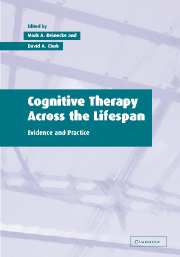Book contents
- Frontmatter
- Contents
- List of contributors
- Foreword
- 1 Cognitive therapy across the lifespan: conceptual horizons
- 2 Cognitive theory and therapy of depression
- 3 Cognitive theory and therapy of bipolar disorders
- 4 Regulation of emotion in generalized anxiety disorder
- 5 Cognitive theory and therapy of obsessions and compulsions
- 6 The cognitive model of panic
- 7 Treating obsessional problems using cognitive-behavioral therapy
- 8 Narcissistic personality disorder
- 9 Cognitive therapy and the self
- 10 Promoting cognitive change in posttraumatic stress disorder
- 11 Cognitive theory and therapy of social phobia
- 12 The cognitive model of bulimia nervosa
- 13 Cognitive therapy and schizophrenia
- 14 Cognitive-behavioral interventions for alcohol abuse and dependence
- 15 Cognitive approaches to understanding, preventing and treating child and adolescent depression
- 16 Cognitive-behavioral interventions in childhood anxiety disorders
- 17 Attention deficit/hyperactivity disorder
- 18 Cognitive-behavioral interventions for children with conduct problems
- 19 Processes of change in cognitive therapy
- 20 Cognitive therapy in the twenty-first century: current status and future directions
- Index
9 - Cognitive therapy and the self
Published online by Cambridge University Press: 05 July 2014
- Frontmatter
- Contents
- List of contributors
- Foreword
- 1 Cognitive therapy across the lifespan: conceptual horizons
- 2 Cognitive theory and therapy of depression
- 3 Cognitive theory and therapy of bipolar disorders
- 4 Regulation of emotion in generalized anxiety disorder
- 5 Cognitive theory and therapy of obsessions and compulsions
- 6 The cognitive model of panic
- 7 Treating obsessional problems using cognitive-behavioral therapy
- 8 Narcissistic personality disorder
- 9 Cognitive therapy and the self
- 10 Promoting cognitive change in posttraumatic stress disorder
- 11 Cognitive theory and therapy of social phobia
- 12 The cognitive model of bulimia nervosa
- 13 Cognitive therapy and schizophrenia
- 14 Cognitive-behavioral interventions for alcohol abuse and dependence
- 15 Cognitive approaches to understanding, preventing and treating child and adolescent depression
- 16 Cognitive-behavioral interventions in childhood anxiety disorders
- 17 Attention deficit/hyperactivity disorder
- 18 Cognitive-behavioral interventions for children with conduct problems
- 19 Processes of change in cognitive therapy
- 20 Cognitive therapy in the twenty-first century: current status and future directions
- Index
Summary
Self processes have a prominent role in the conceptual foundations of cognitive therapy. Cognitive therapy is based upon a constructionist viewpoint and assumes that each individual's construal of his or her experiences constitutes a reality of primary importance for that person (Guidano and Liotti, 1985). These perceptions pertain not only to events in the external world, but also to internal attributes of the self (Beck, 1976). Self-referential thought processes accordingly have received significant attention in cognitive theories of psychopathology and treatment (Beck et al., 1990; Freeman et al., 1990; Beck, 1995; Dattilio and Reinecke, 1996; Young, 1999). It has been recommended that assessment of these types of cognitions, as distinct from those with an external orientation, be used to inform treatment planning for individual clients (Beck and Freeman, 1990; Freeman et al., 1990). Furthermore, intervention strategies directed toward changing beliefs about the self play an essential role in cognitive therapy for specific disorders (e.g., depression).
Despite these considerations, theory and research on the self currently exist as an independent literature. Whereas studies in this area have been concerned primarily with the development and testing of general conceptual models, the emphasis in the cognitive therapy literature has been on the role of self factors within an applied context (i.e., psychotherapy). Furthermore, the focus of most self research has been on nonclinical populations.
- Type
- Chapter
- Information
- Cognitive Therapy across the LifespanEvidence and Practice, pp. 202 - 230Publisher: Cambridge University PressPrint publication year: 2003

